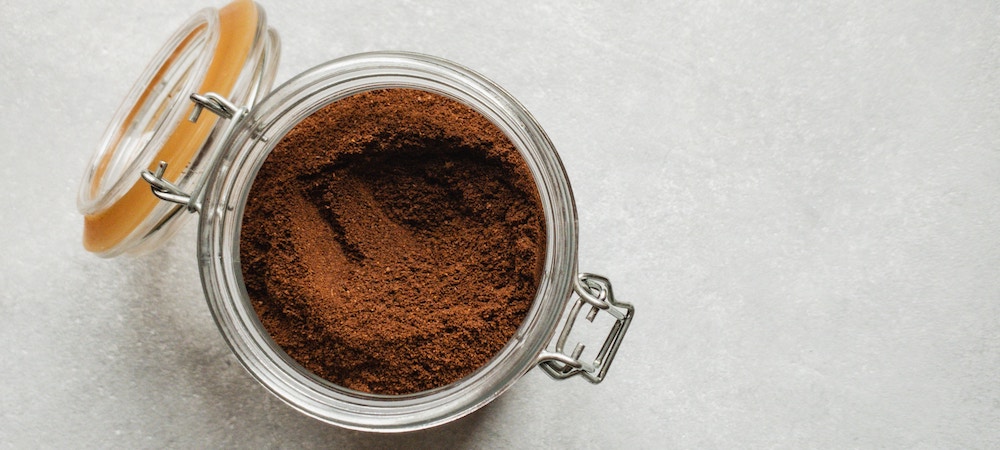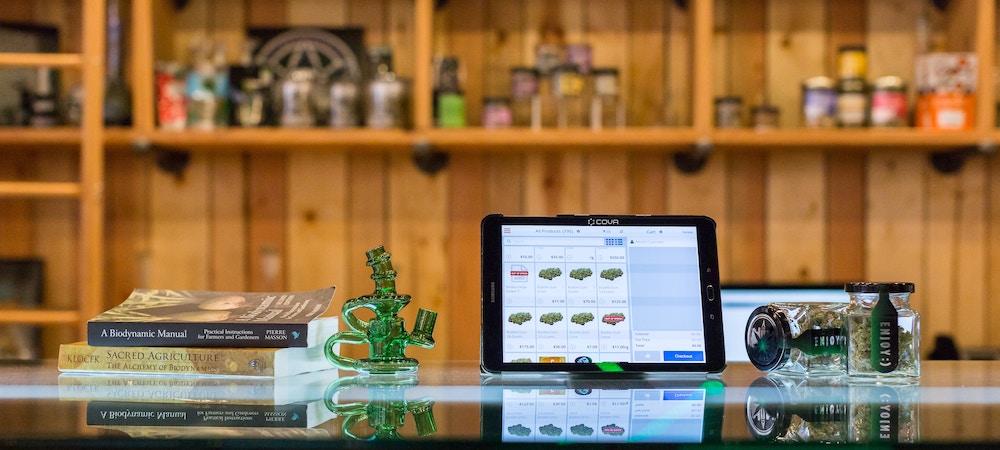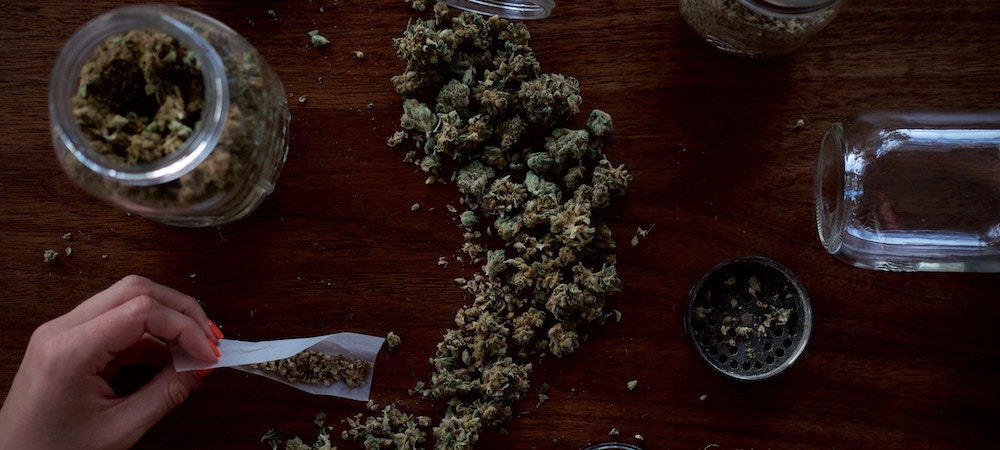Do you get enough sleep regularly? If you’re like most Canadians, the answer is probably no. With so many Canadians not getting enough sleep, how might cannabis play a significant role?
Discover how cannabis impacts sleep and how you can promote better sleep habits intentionally. We’ll explore several important topics related to cannabis and sleep, including expectations, withdrawal, edibles, and more. By the end, you may just find yourself sleeping more soundly.
All about Cannabis and Sleep
Cannabis is known to impact our sleep-wake cycle, primarily through the actions of THC and CBD. We know that THC is the primary producer of the cannabis high. It is also responsible for much of the sedation we experience while high. These effects of THC are mediated via the cannabinoid receptors in the brain (Babson & Bonn-Miller, 2014).
The mechanisms that lead THC to produce sedation are not fully understood, but we have some ideas. First, adenosine is a sleep-promoting agent in the brain that appears to increase in response to THC. Second, THC acts upon cannabinoid receptors in the lateral hypothalamus to inhibit our arousal system. These actions combine to produce sedation and push us toward our bed (Babson & Bonn-Miller, 2014).
The studies that have explored the connections between cannabis and sleep have found mixed results overall. We need many more studies on this critical topic at both the animal model and population levels. According to the studies we have, it appears that THC does help people fall asleep. One major issue here is that THC may reduce how fully rested you feel the next day (Babson et al., 2017).
Medical Cannabis and Sleep
If you suffer from sleep issues while using medical cannabis, consult your medical professional team for support. Getting sleep is even more critical than usual when we are suffering from other medical conditions. We certainly also need studies exploring whether cannabis can help people sleep while suffering from various medical disorders.
One study found that people with high scores on PTSD testing were more likely to use cannabis to facilitate better sleep. In fact, improving sleep quality was a primary driver of the motivation behind using medical cannabis in this clinical population (Bonn-Miller et al., 2014).
Creating Positive Expectations
Expectations are important. One reason why is because it impacts how we behave after consuming cannabis. It also plays a significant role in our cannabis use patterns as recreational consumers and medical cannabis patients. Expectations influence the outcome.
At least one study demonstrated how expectations around the positive role of cannabis in one’s life led to better outcomes. This means that if you believe and act like cannabis will help you sleep better, it’ll be more likely to do so (Altman et al., 2019).
The best thing you can do with cannabis is to maintain a positive attitude. It may not sound like much, but it can go a long way. Later, when you discover our cannabis tips to help get better sleep, remember to consider the value of expectations. Before we get to those tips, let’s discuss a few critical cannabis topics related to sleep.
Cannabis Withdrawal
When someone stops consuming cannabis after prolonged or heavy periods of consumption, withdrawal can occur. Of the temporary cannabis withdrawal symptoms, sleep disturbances are common. This disruption to sleep patterns is one of the most impactful cannabis withdrawal symptoms. Medical treatment options can help individuals get through withdrawal and avoid relapse (Babson & Bonn-Miller, 2014).
The fact that cannabis withdrawal causes sleep problems gives us a clue that consumption benefits it in the first place. Cannabis consumers the world over have stories about how cannabis helps them sleep better. It is important to take breaks from cannabis as well, and when you do, pay attention to how it impacts your sleep. During these times, if you’re having trouble, you may want to consider the topic of the next section, CBD.
Cannabidiol (CBD) and Sleep
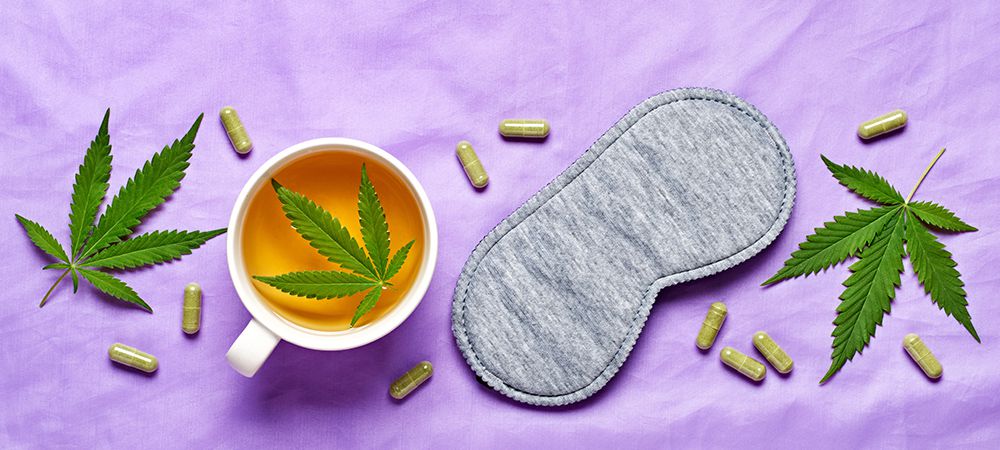
We should note that when it comes to cannabis, it’s not all about THC. The second-most popular cannabinoid is called cannabidiol (CBD). Unlike THC, CBD does not produce a psychoactive high. But, it does have plenty of other benefits for your health and wellness. And sleep is no exception.
CBD has been shown to have therapeutic potential as a treatment for insomnia. Furthermore, CBD positively benefits those suffering from REM sleep behavior disorders (Babson et al., 2017).
Another fascinating feature of CBD is how it can counteract some of the effects of THC. Consumers who combine THC with CBD report fewer adverse effects than with equal doses of THC alone. Taken together, there are plenty of reasons to think that adding some CBD to your evening doses of THC may provide benefits to your sleep.
Cannabis-Infused Edibles and Beverages
Most of us know by now that edibles hit very differently than smoked or vaped cannabis. While smoke/vaped cannabis produces nearly immediate effects that subside over several hours, edibles take much longer. It can take 30 minutes to several hours to feel the full impact – and up to 12 hours or more for effects to entirely subside.
Certain people enjoy taking edibles in the evening, while most of us need more time for the THC to work through our systems. Personal experience with edibles is critical – start low and go slow – and don’t take the edible too late in the day. Also, avoid double-dosing until you have a few successful experiences. Stick with a single dose early in the day until you understand the entire edible journey.
While timing is critical with edibles, the dosage is just as important when consuming any product with THC. To help us understand why dosage is so impactful, let’s learn about the biphasic nature of THC.
The Biphasic effects of THC
Research has noted an exciting feature of THC that is relevant to this discussion. Across numerous domains, THC appears to produce opposite effects at low versus high doses. For example, a small amount of THC can reduce anxiety, while a large one can produce anxiety. The term biphasic (two-phases) is used to describe how THC can act in seemingly opposing ways.
With this in mind, it seems that small doses are better suited for sleep promotion. When one consumes large doses, they are more likely to experience a racing mind and sleep inhibition. What is small or large depends on your personal tolerance and experiences with cannabis.
Another exciting feature of this biphasic property also occurs over time. For example, a large dose may be initially highly stimulating. As your body processes the THC over time, the net effects often switch to sedation. This is why many cannabis consumers smoke their last joint several hours before bedtime. Otherwise, you may end up with a much later night than you hoped for.
Sleep-promoting Cannabis Tips
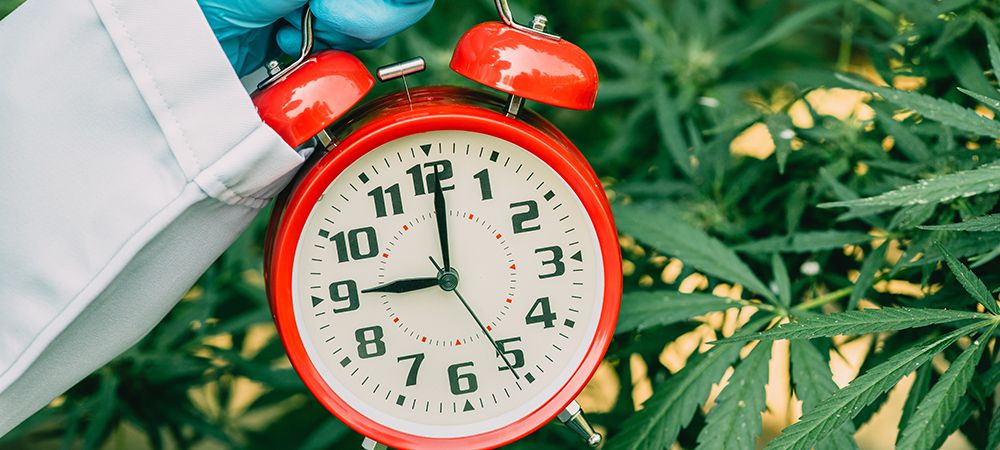
You can take advantage of the biphasic nature of THC through intentional evening consumption habits.
- Avoid large THC doses in the evening (‘large’ according to your tolerance level). Often, less is more with THC when using it intentionally.
- Avoid THC too close to bedtime – Consume your last dose of THC several hours before bedtime (the exact time will depend on your response to cannabis – it can be anywhere from 30 minutes to 6 hours before bedtime).
- Avoid edibles late in the evenings – your last edible should be roughly 4-6 hours before bedtime or more depending on your tolerance – pay close attention to edible dosing to find what works best for you.
- Consider adding more CBD – a higher CBD:THC ratio can take the edge off THC and may improve your sleep quality.
- Avoid screen-time in the hour before bedtime. Consider listening to a good album instead. If you can, get off that smartphone and leave it far away from your person.
There you have it. Five simple tips that can help you create a more intentional relationship with cannabis. Whether it helps to hinder your ability to sleep well largely depends on the actions you take. It’s all up to you, and we believe in you.
Conclusion
You can now consider yourself knowledgeable on the topic of cannabis and sleep. We discovered how THC can help or hinder getting good sleep due to the actions of cannabinoid receptors in the brain. Whether cannabis helps you sleep depends on your tolerance, the THC dosage, timing, and expectations. By carefully managing each of those factors, you can give yourself the best chance of a solid night’s sleep.
Citations
Altman, B., Mian, M., Ueno, L., & Earleywine, M. (2021) Examining and validating the factor structure of the cannabis-associated problems questionnaire. Journal of Substance Use 26:3, pages 292-298. Retrieved from: https://www.tandfonline.com/doi/citedby/10.1080/02791072.2019.1643053?scroll=top&needAccess=true.
Babson, K, & Bonn-Miller, M. (2014). Sleep disturbances: Implications for cannabis use, cannabis use cessation, and cannabis use treatment. Curr Addict Rep 1, 109–114. https://doi.org/10.1007/s40429-014-0016-9.
Babson, K.A., Sottile, J. & Morabito, D. Cannabis, Cannabinoids, and Sleep: a Review of the Literature (2017). Curr Psychiatry Rep 19, 23. https://doi.org/10.1007/s11920-017-0775-9.
Bonn-Miller, M., Babson, K., Vandrey, R. (2014). Using cannabis to help you sleep: Heightened frequency of medical cannabis use among those with PTSD. Drug and Alcohol Dependence 136:162-165. DOI:10.1016/j.drugalcdep.2013.12.008.


